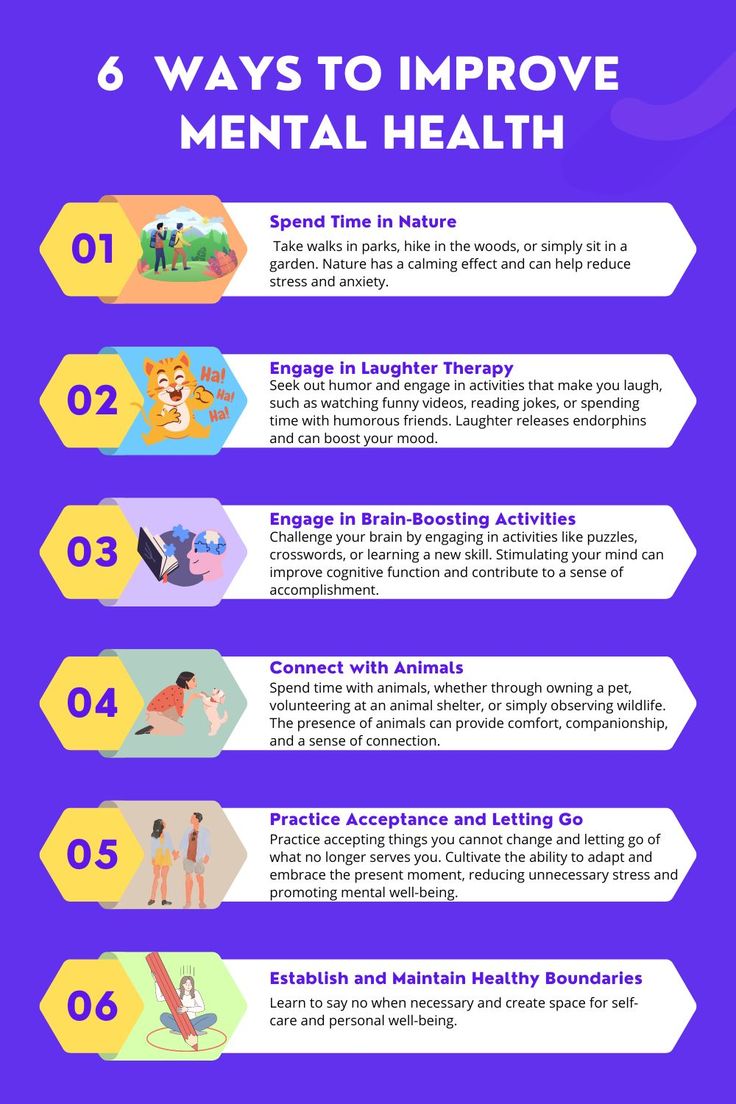5 Effective Ways To Foster Mental Health Acceptance In Your Community

Table of Contents
Educate Your Community About Mental Health
H3: Debunk Stigmas and Misconceptions
The harmful effects of stigma and discrimination surrounding mental illness cannot be overstated. It prevents individuals from seeking help, isolates them from support networks, and perpetuates a cycle of suffering. Common misconceptions include believing mental illness is a character flaw, that it's simply a matter of "willpower," or that recovery is impossible.
To counter these misconceptions:
- Use inclusive language: Avoid stigmatizing terms and instead use person-first language (e.g., "person with depression" instead of "depressed person").
- Share personal stories: Encourage individuals who are comfortable doing so to share their experiences to humanize mental illness and demonstrate that recovery is possible.
- Highlight successful recovery narratives: Showcase stories of individuals who have overcome mental health challenges to inspire hope and demonstrate resilience.
H3: Promote Mental Health Literacy
Mental health literacy is crucial for fostering acceptance. It involves understanding the symptoms of various mental illnesses, recognizing the available resources and support systems, and knowing how to access professional help. This knowledge empowers individuals to support themselves and others effectively.
Resources for accurate information include:
- The National Institute of Mental Health (NIMH) website
- The Mental Health America (MHA) website
- Books and articles from reputable mental health professionals
Practical steps to improve mental health literacy:
- Attend workshops or seminars on mental health awareness.
- Read articles and books on mental health from credible sources.
- Speak to mental health professionals to gain a better understanding of various conditions.
Organize Community Events and Initiatives
H3: Host Awareness Campaigns
Raising awareness is paramount. Creative campaigns can significantly shift community perceptions. Consider:
- Social media campaigns utilizing relevant hashtags and engaging content.
- Fundraising events to support local mental health organizations.
- Awareness walks or runs to bring the community together in a visible show of support.
Utilizing diverse platforms – from social media to local newspapers and community centers – is key to reaching a wide audience.
Examples of successful community-based awareness campaigns include those utilizing interactive exhibits, celebrity endorsements, and partnerships with local businesses.
H3: Create Supportive Spaces
Support groups, peer-to-peer programs, and safe spaces offer invaluable opportunities for connection and shared experience. These spaces foster a sense of community and belonging, crucial for those navigating mental health challenges.
Ideas for creating supportive spaces:
- Host regular meetings in accessible locations.
- Utilize online platforms to connect individuals geographically dispersed.
- Partner with local organizations like churches, community centers, or libraries to provide a neutral and safe environment.
Advocate for Policy Changes
H3: Support Inclusive Policies
Advocating for policies that promote mental health equity and access to care is crucial for systemic change. This includes:
- Improved access to affordable mental healthcare services.
- Anti-discrimination legislation to protect individuals from prejudice and bias.
- Increased funding for mental health research and programs.
Ways to advocate for policy changes:
- Contact your elected officials to express your support for mental health legislation.
- Participate in public forums and town halls to raise awareness and advocate for change.
- Support organizations working to advance mental health policies.
H3: Promote Mental Health in Schools and Workplaces
Mental health support should be integrated into educational and professional settings. This includes:
- Implementing comprehensive mental health programs in schools.
- Providing employee assistance programs in workplaces.
- Promoting mental health awareness training for staff and educators.
Examples of successful initiatives include stress-management workshops, mindfulness programs, and readily available counseling services.
Promote Open Conversations about Mental Health
H3: Start by Sharing Your Own Story
Sharing personal stories (when comfortable) is a powerful way to destigmatize mental illness. Vulnerability fosters empathy and connection.
Tips for sharing personal experiences responsibly:
- Focus on your experience, not on labeling or diagnosing yourself or others.
- Share only what you are comfortable with.
- Be mindful of your audience and the context of your sharing.
H3: Engage in Active Listening
Active listening and empathy are crucial for creating supportive communities. This involves:
- Paying attention without judgment.
- Reflecting back what you hear to ensure understanding.
- Offering support and validation without offering unsolicited advice.
Active listening techniques include maintaining eye contact, nodding, and using verbal affirmations. Responding empathetically involves validating their feelings and experiences.
Partner with Local Organizations
H3: Collaborate with Mental Health Professionals
Collaborating with mental health professionals ensures accuracy and effectiveness. This could involve:
- Joint workshops and educational events.
- Sharing resources and referrals.
- Developing collaborative campaigns.
H3: Leverage Existing Community Resources
Community centers, libraries, religious institutions, and other organizations can provide valuable support. Leveraging existing networks broadens reach and maximizes impact.
Examples of community resources include support groups, peer-to-peer programs, and crisis hotlines.
Conclusion
By implementing these five strategies – education, community events, policy advocacy, open conversations, and collaborative partnerships – we can significantly improve mental health acceptance within our communities. These strategies are interconnected; one strengthens the others, creating a powerful cumulative effect. Building a culture of mental health inclusivity requires sustained effort, but the reward – a community where everyone feels supported and valued – is immeasurable. Start today by committing to at least one of these strategies. Help us cultivate a culture of mental health acceptance and promote a community where everyone can thrive.

Featured Posts
-
 Daily Lotto Results Thursday 17 April 2025
May 02, 2025
Daily Lotto Results Thursday 17 April 2025
May 02, 2025 -
 Edinburgh Fringe 2025 Pussy Riots Alyokhina Stages New Play
May 02, 2025
Edinburgh Fringe 2025 Pussy Riots Alyokhina Stages New Play
May 02, 2025 -
 Juridische Strijd Kampen Dagvaardt Enexis Wegens Stroomnetaansluiting
May 02, 2025
Juridische Strijd Kampen Dagvaardt Enexis Wegens Stroomnetaansluiting
May 02, 2025 -
 Duurzame School Kampen Juridische Strijd Om Aansluiting Op Elektriciteitsnet
May 02, 2025
Duurzame School Kampen Juridische Strijd Om Aansluiting Op Elektriciteitsnet
May 02, 2025 -
 Ap Decision Notes Your Guide To The Minnesota Special House Election
May 02, 2025
Ap Decision Notes Your Guide To The Minnesota Special House Election
May 02, 2025
Latest Posts
-
 Deconstructing The Arguments Around Trumps Transgender Military Ban
May 10, 2025
Deconstructing The Arguments Around Trumps Transgender Military Ban
May 10, 2025 -
 The Impact Of Trumps Transgender Military Ban An Opinion
May 10, 2025
The Impact Of Trumps Transgender Military Ban An Opinion
May 10, 2025 -
 Trumps Transgender Military Policy A Comprehensive Analysis
May 10, 2025
Trumps Transgender Military Policy A Comprehensive Analysis
May 10, 2025 -
 Dissecting Trumps Transgender Military Ban An Opinion Piece
May 10, 2025
Dissecting Trumps Transgender Military Ban An Opinion Piece
May 10, 2025 -
 The Transgender Military Ban Unpacking Trumps Rhetoric
May 10, 2025
The Transgender Military Ban Unpacking Trumps Rhetoric
May 10, 2025
